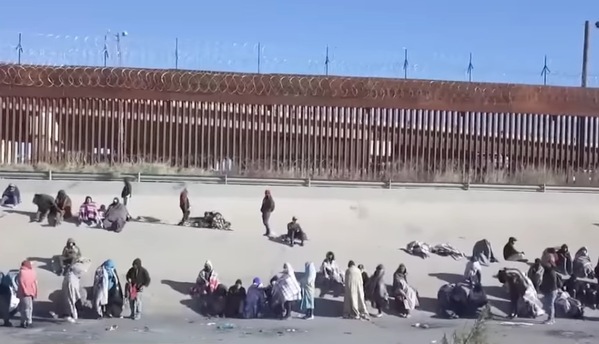
–>
January 11, 2023
At Biden’s press conference last Thursday about border security and enforcement, conservatives probably hoped to hear about clamping down on the illegal immigration that enriches Mexican cartels while killing Americans, jeopardizing their safety, or wreaking havoc in border communities. Instead, they heard how Biden will make it easier to be a legal immigrant.
‘); googletag.cmd.push(function () { googletag.display(‘div-gpt-ad-1609268089992-0’); }); }
To achieve that goal, he’ll abuse the status of immigration parole more than he already does to bypass refugee and immigrant quotas. He’s also rewriting the criteria to make it easier to be a refugee. In one year, he is granting legal immigration status to an additional 380,000 people, and countless more will have an inside track because they have a U.S. anchor. Incredibly, the left complained that Biden wasn’t doing enough for immigrants, while the right questioned what was being done to help the American people and restore rule of law.
If you didn’t hear him say all that, that’s because, as always, the devil is in the details—and the details are stunning.
The Biden administration has announced that it will make it easier for citizens of Venezuela, Cuba, Haiti, and Nicaragua to be paroled in the United States because the U.S. will, in future, automatically accept 30,000 people per month from these four countries. This is on top of the government having already allotted 24,000 parole process spots in October for Venezuelans.
‘); googletag.cmd.push(function () { googletag.display(‘div-gpt-ad-1609270365559-0’); }); }
Determining eligibility for parole is arbitrary, but it is supposed to be done on a case-by-case basis, not granted based on someone’s nationality. A person who is subjectively judged to have an urgent need for humanitarian assistance or a person who offers significant public benefits to the United States can qualify.
“Significant” is a bit of a gimmick because the significant benefit for the United States typically accrues to a single citizen, noncitizen, or family living in the United States. However, once someone is paroled, there are special programs in place to facilitate paroling family members under the age of 21 who are still in Haiti, Cuba, and Nicaragua. These additional parolees are not counted in the monthly quota.

Image: Illegal aliens swarming the southern border. YouTube screen grab.
Although the administration has said people from these countries who do not apply for parole will be turned back at the border, something that caused alarm to the left, that’s just a smokescreen. That’s because people from places other than Cuba can immediately qualify for a different status—Temporary Protection Status (TPS).
TPS is granted to people from certain countries where humanitarian assistance is deemed appropriate. It’s another subjective criterion. TPS is granted for 18 months, but it can be renewed indefinitely. Many TPS immigrants have been here for over 10 years. In July 2022, it was estimated that 343,000 Venezuelans in the United States are eligible for TPS, and 393,255 people from Central America and Haiti are TPSers are already residing in the United States.
Biden said all these people will be vetted. Really? Good luck getting data from our friends in Venezuela, Cuba, Nicaragua, and the dysfunctional state of Haiti. But fear not; the government has a Plan B. Candidates can personally attest to their own good character and the absence of addictions and certain diseases.
Do you know how good our vetting process was with Afghan refugees? After these parolees—not refugees—arrived, 31 Afghan refugees were found to have red flags. The Department of Homeland Security could only locate three of the 31. Another 50 “indicated potentially significant security concerns.” This meant their fingerprints were found on improvised explosive devices, and they were known or suspected terrorists.
‘); googletag.cmd.push(function () { googletag.display(‘div-gpt-ad-1609268078422-0’); }); } if (publir_show_ads) { document.write(“
The administration also plans that, in both 2023 and 2024, it will accept 20,000 refugees from the Caribbean and Central America, a number allegedly triple the number currently eligible. They are classifying people from these countries as refugees when most are not.
Someone who is a refugee or asylum seeker technically qualifies because he or she cannot return to the home country because of a well-founded fear of persecution due to the person’s race, membership in a particular social group, political opinion, religion, or national origin. Asylum is not given to poor people tired of crime and violence. It couldn’t be. Billions would literally seek asylum in the United States.
Nonetheless, the administration is classifying as refugees poor people who are understandably tired of the crime and violence in their broken nations. You can hear people from dozens of countries that experience a lot more crime and violence asking for equal treatment. Being a refugee in the United States is like winning the lottery for a poor person.
Since Biden came to office, the numbers being let in under the premise of being legitimate asylum seekers are astronomical. As of December 2022, 1,565,966 people were living in the United States waiting for an asylum hearing.
People with an asylum court hearing are about 60% likely to show up for their hearing, which should be no surprise because most are rejected, which means they will be asked to undergo voluntary deportation. No-shows and voluntary deportees often join the ranks of other illegals.
Between January 2021 and December 31, 2022, illegal immigrants increased by an estimated 1.28 million. Based on the asylum backlog, it looks like we probably have another 800,000 soon-to-be illegals.
Last Thursday, the left went crazy because Biden claimed he will clamp down on the farcical “asylum process.” They know that asylum is central to the expanding population of illegals. That Biden is disappointing his base this way may be because his administration is acknowledging that it has allowed so many ostensible “asylum seekers” into the United States to wait for a hearing that even the administration realizes it’s gotten out of hand.
Tripling the cap on the number of refugees from the Caribbean and Central America also relies on the administration’s five-card Monty trick for counting refugees. Did you know the United States only accepted 24,500 refugees in 2022? The 68,000 Afghan “refugees” who came in were counted as parolees, and the same was done for 82,000 Ukrainians.
Unaccompanied minors (under 21) are another parlor trick to hide numbers. They are immediately designated as refugees, but they are not counted as refugees. Under Biden, over 274,000 unaccompanied minors have been processed, of whom 92% were from Central America. (Between 2014 and 2017, the total was 3,092.) A 2015 study showed that criminals sponsored 12% of the minors, including human traffickers.
In 2021, 66% of the unaccompanied minors were males, and 72% were 15–17 years old. The average age of a gang member is 17-18. How many of the new admissions will join gangs or work for cartels is unknown because post-release follow-up is optional. Latinos make up 18.5% of the population, but they are estimated to be 46% of gang members. Gangs are responsible for 13% of all murders, 48.9% of violent crimes, 42.9% of property crimes, and 39.9% of drug sales.
TPS, parole, and fake refugee status are all end runs around the “normal” immigration quotas and vetting process. In 2021, more “temporary” immigrants became citizens than new arrivals.
The Biden administration is also committed to addressing the problem of drug smuggling, although everyone was light on details. For example, Biden explained,
Since August of last year, Customs and Border Patrol have seized more than 20,000 pounds of deadly fentanyl. That’s enough to kill—kill as many as 1,000 people in this country.
Really? Well, no. Biden’s administration might be doing more if its members knew that 20,000 pounds of fentanyl are enough to kill every American. In 2021 alone, lesser amounts of fentanyl killed about 71,000 Americans.
But where the administration really was light on details was the claim that “We’re going to get these [border]communities more support.” Then again, Joe Biden and Kamala Harris aren’t concerned with addressing the border crisis, including overwhelmed border communities, increased crime, and Americans dying from drug overdoses. They’re too busy recruiting future Democratic voters.
<!– if(page_width_onload <= 479) { document.write("
“); googletag.cmd.push(function() { googletag.display(‘div-gpt-ad-1345489840937-4’); }); } –> If you experience technical problems, please write to [email protected]
FOLLOW US ON
<!–
–>
<!– _qoptions={ qacct:”p-9bKF-NgTuSFM6″ }; ![]() –> <!—-> <!– var addthis_share = { email_template: “new_template” } –>
–> <!—-> <!– var addthis_share = { email_template: “new_template” } –>







